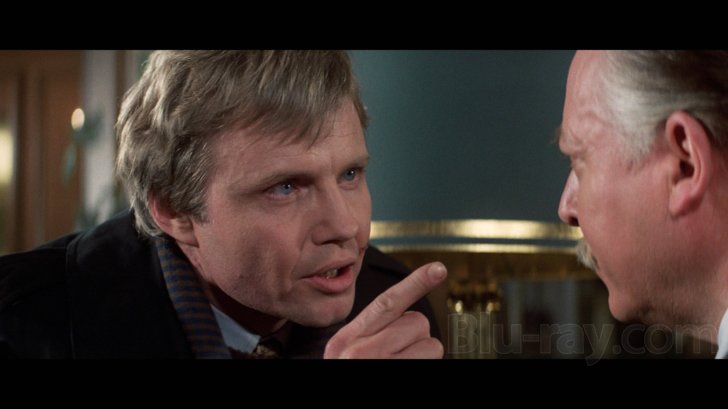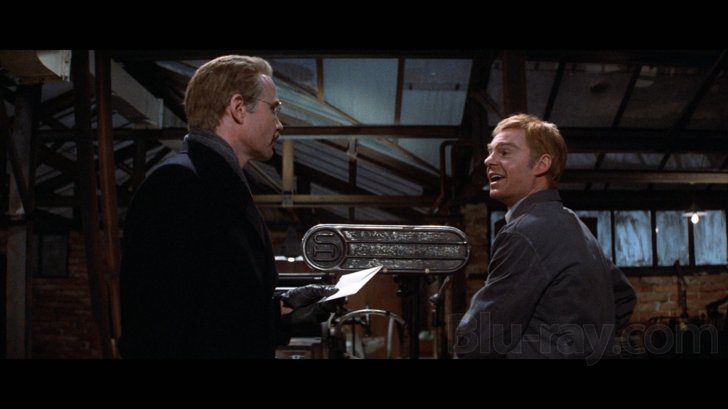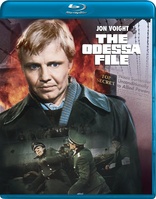The Odessa File Blu-ray Movie
HomeThe Odessa File Blu-ray Movie 
Image Entertainment | 1974 | 129 min | Rated PG | May 15, 2012Movie rating
6.9 | / 10 |
Blu-ray rating
| Users | 4.0 | |
| Reviewer | 4.0 | |
| Overall | 4.0 |
Overview
The Odessa File (1974)
A German journalist attempts to track down Nazi war criminal.
Starring: Jon Voight, Maximilian Schell, Maria Schell, Mary Tamm, Derek JacobiDirector: Ronald Neame
| War | Uncertain |
| Drama | Uncertain |
| Thriller | Uncertain |
Specifications
Video
Video codec: MPEG-4 AVC
Video resolution: 1080p
Aspect ratio: 2.35:1
Original aspect ratio: 2.39:1
Audio
English: LPCM 2.0 Mono
Subtitles
English SDH, Spanish
Discs
25GB Blu-ray Disc
Single disc (1 BD)
Playback
Region A (locked)
Review
Rating summary
| Movie | 4.0 | |
| Video | 4.5 | |
| Audio | 4.0 | |
| Extras | 0.0 | |
| Overall | 4.0 |
The Odessa File Blu-ray Movie Review
Imperious Bastards
Reviewed by Michael Reuben April 30, 2012After successfully turning the ocean liner Poseidon upside down, director Ronald Neame took on a different challenge: upending the world of a young German reporter who stumbles into a global conspiracy by former Nazi officers in The Odessa File, based on the second novel by bestselling author Frederick Forsyth. Although the screen adaptation of Forsyth's book made significant changes, especially to the ending, Neame's film retained Forsyth's essential perspective, in which psychology and motivation took a back seat to logistics and action. The same approach worked effectively in Fred Zinneman's film of Forsyth's first novel, The Day of the Jackal (the original 1973 film, not the unfortunate 1997 remake with Bruce Willis), and Neame was too smart a director to fix something that wasn't broken. But where Zinneman faced the challenge of telling his story through a protagonist who happened to be a cold-blooded assassin (hired to kill French president Charles de Gaulle), Neame had a different problem: that of a central character, Peter Miller, who quickly gets in way over his head and makes one risky choice after another, endangering both his own life and that of his adoring girlfriend, and all for reasons that seem less than compelling until they finally come into focus late in the story. A big part of Neame's solution was to cast Jon Voight, still young but already a familiar face after the success of Midnight Cowboy. Voight's blond hair and blue eyes made him a convincing young German of the early Sixties, and he mastered German-accented English with astonishing accuracy (at least to my ear, and I spent a lot of time in Germany in the Seventies). Voight's ability to command an audience's sympathy, which had been so effective in playing Joe Buck, proved invaluable in his portrayal of Peter Miller, who needs to keep the audience on his side, even when he behaves thoughtlessly, as he often does. Neame shot much of the film on location, which gives The Odessa File an authenticity that can't be faked on a backlot. Fortunately for Blu-ray fans, Image and Sony have provided a fine and faithful transfer, so that viewers can appreciate every detail.

The film opens with a brief prologue in the Middle East and text screens providing background and vouching, in Forsyth's name, for the authenticity of the film's historical research. In 1963, the principal enemy of Israel was Egypt, which, under President Gamal Abdel Nasser, had assumed leadership of the Arab world. Nasser's military is believed to be building missiles with chemical and biological warheads to be used against Israel, but the weapons are useless without a precision guidance system, which is being developed somewhere in Germany by "the Odessa". The Odessa is an acronym for Organisation der ehemaligen SS-Angehörigen, which translates as "organization of former SS officers". The civilian scientists building the guidance technology don't realize they're working for the Odessa or the use for which their work is intended. Against this background, we're introduced to Peter Miller (Voight), a freelance journalist in Hamburg, who, on the night of President Kennedy's assassination, follows an ambulance to what he thinks may be a crime scene and stops to investigate. But Miller's buddy on the Hamburg police force, Karl (Gunnar Möller), tells him it's nothing, just an elderly man who committed suicide. A day or two later, though, Karl slips Miller the dead man's diary. It contains a remarkable story. The dead man is Salomon Tauber (played as a young man in black-and-white flashbacks by Towje Kleiner, with old-age narration supplied by Cyril Shaps). He is a survivor of the Riga concentration camp, presided over by a brutal SS officer named Eduard Roschmann (Maximillian Schell). In harrowing detail, Tauber recounts the many atrocities committed by Roschmann, both personally and through orders to subordinates. Roschmann was so much a law unto himself that he killed fellow Germans who got in his way. Tauber personally saw Roschmann execute a German army captain who attempted to use a ship to evacuate wounded German soldiers, in violation of Roschmann's claim that the ship was reserved for the SS. Despite his editor's lack of interest, and against the urging of his live-in girlfriend, Sigi (Mary Tamm), and his devoted mother (Maria Schell), Miller begins to investigate Tauber's account. He immediately makes a shocking discovery. Tauber's final diary entry reports that Roschmann disappeared in 1945, just ahead of the advancing Russian army. But when Miller speaks to Tauber's friend, Marx (Martin Brandt), another camp survivor, he learns that Tauber saw Roschmann exiting the opera in Hamburg just a few weeks ago. When he reported what he'd seen to the police, they dismissed his account for lack of evidence. He killed himself in despair. It's Marx who first mentions Odessa to Miller. Miller relays this to his cop friend, Karl, who immediately gets jumpy and begs him to drop the matter. The government office charged with investigating war crimes is equally unresponsive, even overtly threatening. Miller decides to pursue the matter on his own and immediately reveals his ineptitude by "infiltrating" a reunion of former Panzer division officers that looks and sounds like a Nazi war rally, complete with thinly veiled rhetoric and toasts resembling "sieg, heil!" salutes. Miller's youth makes him conspicuous among these old-timers, but he's so oblivious to the danger that he starts taking flash photos, at which point he's ushered out and beaten. Eventually, Miller leaves town and begins the arduous process of making contact with Simon Wiesenthal (Shmuel Rodensky), the famous Nazi hunter, whose address is a closely guarded secret to protect him from his many enemies. When they finally meet, Wiesenthal shares his file on Roschmann and advises Miller on where to look for further information. It isn't long before Miller's path crosses that of the Israeli secret service, who recognize in Miller a perfect candidate for infiltrating the Odessa. Miller accepts the assignment despite the enormous danger, because Wiesenthal has told him that the key to locating Roschmann is finding the man whom Odessa uses to create new identity papers for former SS officers to "rehabilitate" them as respectable members of society. The forger turns out to be a mild-mannered fellow named Wenzer (Derek Jacobi, not yet famous for I, Claudius), who is deeply devoted to his mother and has kept meticulous records of every identity he's ever faked for the secret society. Meanwhile, the Odessa is frantically trying to find Miller by keeping a close watch on Sigi in Hamburg. An efficient assassin named Gustav Mackensen (Klaus Löwitsch) has been brought in to handle the work, and he has the assistance of strategically placed members of the Hamburg police department. If Miller were a professional spy, he might anticipate this possibility, but he isn't—and he doesn't. The Odessa File is both an entertaining thriller and a textbook example of the "invisible" style of directing that has largely disappeared. As you watch the film, you're unaware of Neame's directorial guidance, and yet it's there at all times. It has to be for the film to sustain suspense so successfully for its 128-minute running time, despite the lack of major action scenes and a story that unfolds almost entirely through dialogue. Neame keeps his takes short and cuts frequently but not abruptly. He has people moving in the frame, but in casual motions that fit naturally with what they're engaged in at the moment, and he has the actors deliver their lines in a heightened, urgent style that's almost theatrical (it helps that they all have accents). All that cinematic energy creates a world in which the Third Reich is still a palpable reality for the characters, even the ones who say they want to forget it. (If it didn't still feel so real, they wouldn't be trying so hard to forget.) Indeed, what distinguishes The Odessa File from the typical American Seventies paranoid thriller is the clarity of its enemy. In films like 3 Days of the Condor or The Parallax View, the harried protagonist is never entirely sure who the enemy is that he's trying to defeat (or escape). But in The Odessa File, Peter Miller knows exactly who the enemy is. The problem, first, is finding him; second, forcing him out into the light; and finally, deciding what to do with him. The last one turns out to be tougher than Miller expected.
The Odessa File Blu-ray Movie, Video Quality 

The 1080p, AVC-encoded Blu-ray of The Odessa File is another exemplary effort from Sony and Image Entertainment. Even when working in outdoor locations, the film's Oscar-winning cinematographer, Oswald Morris (Fiddler on the Roof), meticulously lit each scene to capture a detailed image even with what were then relatively slow anamorphic lenses. The benefits of his work are immediately evident in such scenes as the outdoor training that Miller undergoes by Israeli intelligence, or Mackensen's pursuit of Sigi through the Hamburg streets at night, or the wide shots of the Panzer officer reunion. The detail in these and many other scenes is exceptional, and the Blu-ray renders them faithfully. The film's palette is a muted one, which is appropriate for Germany in 1963 when it was still rebuilding from the war. However, fleshtones are generally accurate, and an occasional flash of bright color (usually red), indicates that the color reproduction is accurate. The film's grain structure is visible but not accentuated, and it moves naturally without any indication of inappropriate digital tampering. Despite Image's continued addiction to BD-25s, I did not encounter any compression artifacts; the compressionist no doubt benefitted from the 2.35:1 aspect ratio (since black space is easy to compress) and the lack of major action sequences.
The Odessa File Blu-ray Movie, Audio Quality 

The Blu-ray case lists the sound mix as "Uncompressed PCM Stereo" and, indeed, the track is PCM 2.0, but the film was released in mono, and the left and right tracks are identical. Play them through a matrix decoder, and the sound collapses to the center. But it's a good mono track, with fine dynamic range, clear dialogue, neatly edited effects and a moody score by a composer named Andrew Lloyd Webber, who was then relatively new on the scene. The song that plays over the titles, "Christmas Dream", is sung by Perry Como and has lyrics co-written by Tim Rice. Tim Rice and Andrew Lloyd Webber—what ever happened to them?
The Odessa File Blu-ray Movie, Special Features and Extras 

The 2000 Sony DVD of The Odessa File contained the film's trailer, a few "bonus" trailers, production notes and so-called "talent" bios. The Blu-ray contains no extras.
The Odessa File Blu-ray Movie, Overall Score and Recommendation 

The Odessa File is an artfully constructed, classically filmed, old-fashioned thriller. They don't make 'em like this anymore, because no one knows how. Image and Sony have produced a first-rate Blu-ray, which is highly recommended.
Similar titles
Similar titles you might also like

Tobruk
1967

Battle for Incheon: Operation Chromite
Operation Chromite / In-cheon sang-ryuk jak-jeon
2016

Confessions of a Nazi Spy
Warner Archive Collection
1939

The Long Voyage Home
Limited Edition / Import
1940

Eagles Over London
La Battaglia d'Inghilterra
1969

Went the Day Well?
48 Hours
1942

The Counterfeit Traitor
1962

Ice Cold in Alex
1958

Eye in the Sky
2015

The Exception
2016

Man Hunt
Limited Edition to 3000 - SOLD OUT
1941

36 Hours
Warner Archive Collection
1965

The Eagle Has Landed
1976

Run Silent, Run Deep
Special Edition
1958

The Bridges at Toko-Ri
1954

Force 10 from Navarone
1978

Ambush Bay
1966

The Sea Chase
Warner Archive Collection
1955

Foreign Correspondent
1940

A Soldier's Story
1984
